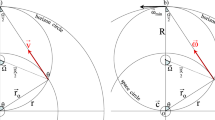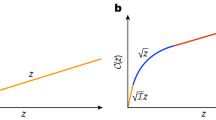Abstract
IN NATURE of October 9, 1937, under the heading "Red shifts and the Distribution of the Nebulæ", there is repeated a statement of Dr. Hubble's to the effect that hyperbolic space of negative curvature leads to a distance-distribution of nebulæ which is contrary to observation. It is, however, well known that the distances of nebulæ are in no sense 'observed': they are defined by means of theoretical formulæ in terms of the observed apparent magnitudes of the nebulæ. Moreover, the definitions vary with the process of distance-measurement envisaged. Dr. Hubble's statement is, therefore, only true if (a) we accept his particular definition of distance in terms of apparent photographic magnitude, and if (b) we also accept his identification of this distance with a certain one of the quantities figuring as distance in the model universes of general relativity.
This is a preview of subscription content, access via your institution
Access options
Subscribe to this journal
Receive 51 print issues and online access
$199.00 per year
only $3.90 per issue
Buy this article
- Purchase on Springer Link
- Instant access to full article PDF
Prices may be subject to local taxes which are calculated during checkout
Similar content being viewed by others
Author information
Authors and Affiliations
Rights and permissions
About this article
Cite this article
MCVITTIE, G. Hyperbolic Space. Nature 140, 773–774 (1937). https://doi.org/10.1038/140773c0
Published:
Issue Date:
DOI: https://doi.org/10.1038/140773c0
Comments
By submitting a comment you agree to abide by our Terms and Community Guidelines. If you find something abusive or that does not comply with our terms or guidelines please flag it as inappropriate.



